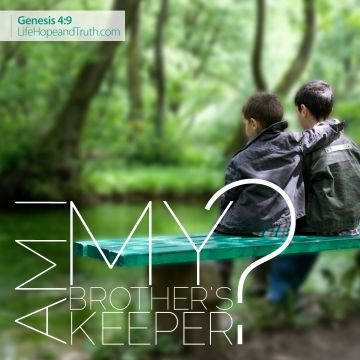Am I My Brother’s Keeper?
Then the LORD said to Cain, “Where is Abel your brother?” He said, “I do not know. Am I my brother’s keeper?

This lie, told directly to God, is the first recorded human lie. Interestingly, murder and lying are connected in John 8:44 as two central characteristics of the character of Satan. This account shows us the common progression of sin. Sin often begets further sin. In this case, Cain’s sin of murder led to his sin of lying.
A similar progression can be found in the account of David’s adultery with Bathsheba (2 Samuel 11). David’s sin of adultery was followed by lying and a murder to cover up the adultery.
In contrast, Christians are to be known as truth tellers in all things (Ephesians 4:25).
After his lie, Cain further answered God with this sarcastic statement: “Am I my brother’s keeper?” By saying this, Cain was essentially saying he was not responsible for his brother’s well-being. This shows a calloused lack of love and concern on Cain’s part. This was a result of his hatred and anger. Human history has been marked by this core attitude of a lack of concern for the care and well-being of others.
A few verses earlier in Genesis we are told “Abel was a keeper of sheep” (Genesis 4:2). Though the Hebrew words for keeper are different, the meanings are similar. Obviously, Cain was not in charge of Abel in the way a shepherd is in charge of sheep, but the attitude of loving and protecting others is praised throughout the Bible (Psalm 23:1; Isaiah 40:11; John 10:11-12; Acts 20:28).
True Christians understand the error of Cain’s statement. Philippians 2:3-4 clearly expresses the attitude we are to have toward others: “In lowliness of mind let each esteem others better than himself. Let each of you look out not only for his own interests, but also for the interests of others.”
Christians are to show brotherly love to their own families, to their fellow church members, and to all.
- “Be kindly affectionate to one another with brotherly love, in honor giving preference to one another” (Romans 12:10, emphasis added throughout).
- “But concerning brotherly love you have no need that I should write to you, for you yourselves are taught by God to love one another” (1 Thessalonians 4:9).
- “Let brotherly love continue” (Hebrews 13:1).
In that sense, we are our brother’s keeper.
This outgoing concern toward other people is the result of a life driven by love (Mark 12:31; Luke 6:27; 1 John 4:16).
To learn more about the depth of love God expects from His people, read our article “Love of God.”


